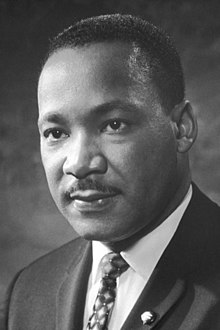
Martin Luther King%2C Jr..
(Image by Wikipedia (commons.wikimedia.org), Author: Nobel Foundation) Details Source DMCA
Duluth, Minnesota (OpEdNews) June 16, 2023: Recently I read the American journalist and biographer Jonathan Eig's new massively researched, lucidly written, fast-paced 2023 biography King: A Life (Farrar, Straus and Giroux). The Reverend Dr. Martin Luther King, Jr. (1929-1968; Ph.D. in theology, Boston University, 1955) was still pursuing his graduate studies in theology at Boston University when the U.S. Supreme Court issued its unanimous decision of Brown v. Board of Education in Topeka, Kansas, in May 1954.
The Brown case against the Topeka school board was brought by the National Association for the Advancement of Colored People (NAACP) and argued by Thurgood Marshall. Today, when Trump and his white MAGA supporters imagine an idealized time in the 1950s when America was great, I suspect that they imagine that idealized time as being before the supreme Court ruling in May 1954.
America had emerged from World War I victorious, and America also emerged from World War II victorious. A grateful nation even elected General Dwight D. Eisenhower president in 1952. Consequently, it fell to President Eisenhower initially to enforce the 1954 Supreme Court ruling ending public school segregation.
Now, young Dr. King did not begin his life in political activism until December 5, 1955, in preaching about Rosa Parks (pp. 147 and 510). Eig says, "It was the day, at the age of twenty-six, that King found his voice, preaching a mixture of political agitation and gospel, making the radical seem reasonable, perhaps inevitable" (p. 147).
In Eig's fast-paced biography, he moves us quickly through the major landmarks in King's life, including how he was named as Time magazine's Man of the Year in 1963 (pp. 351-365) and how he received the Nobel Peace Prize in 1964 (pp. 385-391). However, as time moved on, King appeared to fade. Overworked and exhausted, King went of a working vacation in Ocho Rios in Jamaica (pp. 513-514) -- where he worked on a new book titled Where Do We Go from Here: Chaos or Community? (Harper & Row, 1967; but I am using the 2010 3rd edition published by Beacon Press).
In Eig's Chapter 44: "A Revolution of Values" (pp. 522-530), he reports that a congressional investigation reported that "[b]etween 1965 and 1967, 118 civilians and 12 law enforcement officers had been killed in unrest, while almost 29,000 people, the vast majority of them Black men, had been arrested" (p. 526). Eig also says, "King's new book bore the perfect title for these days of rage: Where Do We God from Here: Chaos or Community?" (p. 527).
As Eig reports, the white liberal Andrew Kopkind wrote a scathing review of King's book in The New York Review of Books (dated August 24, 1967). In it, among other things, Kopkind said that King's book "sounded as if it were meant to be 'read aloud in suburban synagogues.' That was meant as the ultimate insult" (p. 527).
Now, on the occasion of the fiftieth anniversary of King's assassination, the prolific American Protestant theologian Gary Dorrien contributed the essay "The Radical King: Democratic Socialism, Personal Idealism, Anti-Militarism, and Black Power" to the special issue of Telos, serial number 182 (Spring 2018): pp. 47-65, on the theme "Martin Luther King, Jr.: Fifty Years On." In it, Dorrien says, "Where Do We Go from Here was King's best book: eloquent, practical, timely, judicious, and visionary" (p. 62).
In these five ways, King's last book resembles Pope Francis' widely read 2015 eco-encyclical - which is also eloquent, practical, timely, judicious, and visionary. (The pope's visionary 2015 eco-encyclical is available in English and other languages at the Vatican's website.)
In addition to papal encyclicals, there is a category of papal documents known as apostolic exhortations. Just as encyclicals may be addressed not only to practicing Catholics but also to all people of goodwill, so too apostolic exhortations may also be addressed to all people of goodwill. Granted, King was never the pope. Nevertheless, his last book could be categorized as an apostolic exhortation by a Baptist minister to all people of goodwill.
Also on the occasion of the fiftieth anniversary of King's assassination, Michele Moody-Adams contributed the essay "The Path of Conscientious Citizenship" to the book To Shape a New World: Essays on the Political Philosophy of Martin Luther King, Jr., edited by Tommie Shelby and Brandon M. Terry (Belknap Press of Harvard University Press, 2018, pp. 269-289). In it, she says, "I contend that, for King, conscientious citizenship is a way of living that seeks to give substance to the idea that justice is indivisible, aspiring to an ideal that (adapting a notion from Josiah Royce) King called the 'beloved community' - by which he meant a world that would allow reconciliation between the former oppressed and their former oppressors, and embody an all-embracing love for humanity" (p. 270).
To back up her parenthetical claim that King borrowed the notion of a beloved community from Royce, Moody-Adams references (p. 399) two articles: (1) Gary Hernstein's "The Roycean Roots of the Beloved Community" in The Pluralist, volume 4, number 2 (Summer 2009): pp. 91-107; and (2) Rufus Burrow's "The Beloved Community: Martin Luther King, Jr. and Josiah Royce" in Encounter, volume 73, number 1 (2012): pp. 37-64.
In any event, King's last book is also prescient in his discernment of chaos as the alternative to the visionary beloved community. We Americans have certainly not achieved a viable sense of the visionary beloved community. Indeed, Trump and his white MAGA supporters represent chaos.
King's last book unfolds in the following six chapters, followed by the lengthy "Appendix: Programs and Prospects" (pp. 203-214; "Notes" (pp. 215-216); and an "Index" (pp. 217-223):
(Note: You can view every article as one long page if you sign up as an Advocate Member, or higher).




